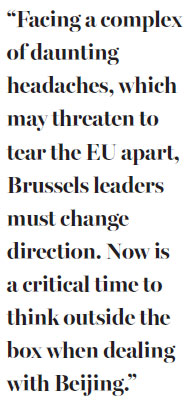EU must change its China strategy
Updated: 2016-07-22 07:35
By Fu Jing(China Daily Europe)
|
|||||||||
If the bloc cannot guarantee the safety of its citizens, tourists and investors, it should not put pressure on other countries
When foreign ministers from European Union members gathered on July 18 for their monthly meeting in Brussels, they did so against a quickly altered backdrop of change and violence.
One change was the appearance of Boris Johnson. Britain's new foreign secretary, a key supporter of Brexit in the run-up to the nation's EU referendum last month. He was appointed after Theresa May replaced David Cameron as British prime minister.
The violence came in the form of a failed military coup in Turkey, a nation pursuing EU accession, and a terrifying terrorist attack in Nice, France, on Bastille Day, normally a day of celebration.

To go with this, The Hague's arbitration tribunal on the South China Sea issued a justice-damaging ruling on July 12, supporting the case brought by the Philippines.
European Council President Donald Tusk and European Commission President Jean-Claude Juncker concluded talks with their Chinese counterparts on deepening strategic partnership at the annual summit in Beijing before flying to Ulaanbaatar, Mongolia, to participate in the Asian-Europe Meeting.
The fast-evolving circumstances in Europe led US Secretary of State John Kerry to have breakfast with European ministers in Brussels before getting down to discussing their agenda on July 18.
The foreign ministers concluded a strategy for the EU's policy toward China. (Beijing has consistently criticized Brussels for seeking coordination with Washington when it comes to its China policy, although it's unknown how Kerry may have exerted his influence at the breakfast meeting.) However, Brussels, which unveiled a draft of the strategy weeks ago, must accept that the bloc is undergoing mounting challenges, which are far more daunting than expected.
For example, terrorism attacks have occurred one after another. This year, France has encountered three major tragedies, while Prime Minister Manuel Valls has said the country must now learn to live with terrorism. Such is the reality, but it is a frightening message that will deter investors and tourists. Other European countries are also not safe, with Brussels hit by a deadly attack in March.
Meanwhile, the attempted coup in Turkey indicates once again that other parts of Europe are also in trouble, not to mention the situation in northern Africa, western Asia and Ukraine.

The worsening security situation in and around Europe, coupled with the crises of unemployment, a steady influx of migrants and a likely domino effect from Britain's exit from the EU all add up to difficult times.
So, when EU foreign ministers convene, they must conclude their strategy on policy toward China, instead of paying lip service to claims of safeguarding values. If the union cannot guarantee the safety of its citizens, tourists and investors, it's better not to put pressure on other countries.
At this juncture, what Brussels needs most is a pragmatically ambitious and visionary framework of foreign policy toward Beijing, sending a clear message that could encourage Europeans to trust the union and its leaders' wisdom.
The ministers must carefully review the constructive and friendly messages Beijing has repeated at China-EU summits and at gatherings such as the Asia-Europe Meeting.
So far, Brussels has not signaled it has the courage and sincerity to treat Beijing as a full strategic partner. For example, it still frequently uses murky wording when referring to Beijing.
Regarding its stance on the South China Sea dispute, the EU says it will not take sides on the sovereignty dispute, but it has urged Beijing to obey international rules.
The reality is that leaders in Brussels, preoccupied by domestic headaches, have not really understood the content of the rules related to the dispute.
This year, Brussels has wasted a lot of time fighting Beijing over its market economy status and the global overcapacity in steel. Facing a complex of daunting headaches, which may threaten to tear the EU apart, Brussels leaders must change direction. Now is a critical time to think outside the box when dealing with Beijing.
Such ideas and actions should include a faster pace in granting China market economy status, getting down to talks on free trade, setting up joint funds to support each other's mega projects and encouraging people-to-people exchanges.
The list could be even longer.
The author is deputy chief of China Daily European Bureau. Contact the writer at fujing@chinadaily.com.cn
(China Daily European Weekly 07/22/2016 page11)
Today's Top News
French president urges Britain to begin EU exit talks
Turkey to restructure its army after coup attempt
UK to keep close economic ties with Germany: May
China's Fosun buys UK's Wolves for 45 million pounds
Rio 2016: Russia loses doping appeal
Brussels police: Bomb aleart was false alarm
May takes center stage in parliament's box-office show
Turkey's failed coup to consolidate Erdogan's power
Hot Topics
Lunar probe , China growth forecasts, Emission rules get tougher, China seen through 'colored lens', International board,
Editor's Picks

|

|

|

|

|

|







